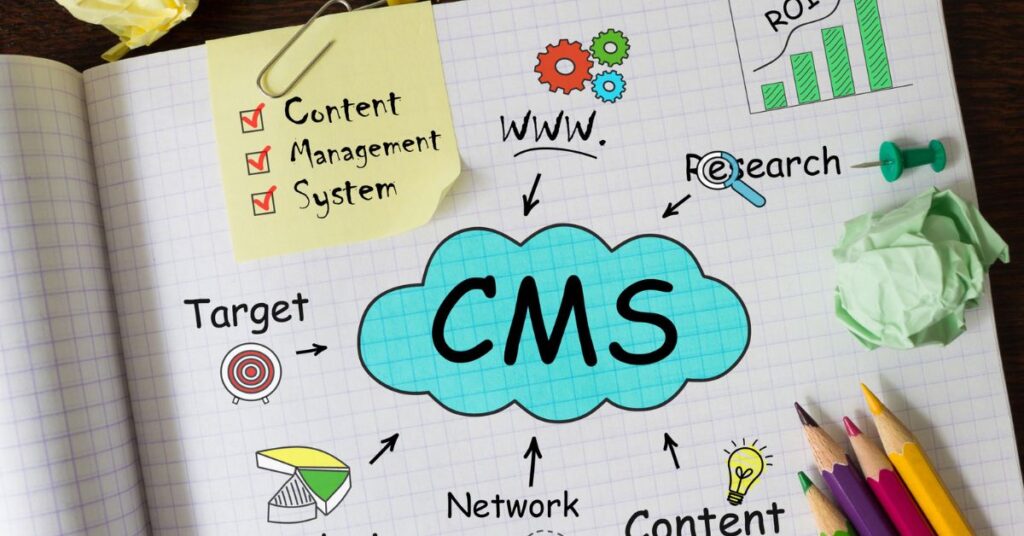A Content Management System (CMS) is a software application that allows users to create, manage, and modify digital content without needing extensive technical knowledge. It is widely used for building and maintaining websites, blogs, and e-commerce platforms. A CMS makes content marketing more efficient by simplifying content creation, editing, and publishing.
With the growing importance of digital presence, businesses rely on CMS platforms to manage their online content seamlessly. Whether you are a blogger, entrepreneur, or a large organization, using a CMS ensures streamlined content workflows and improved efficiency. By reducing the dependency on developers for routine website updates, businesses can focus on producing high-quality content and improving user engagement.
How a Content Management System Works?
A CMS consists of two main components:
- Content Management Application (CMA) – This is the user-friendly interface where content is created, edited, and published without requiring coding expertise.
- Content Delivery Application (CDA) – This processes the content and ensures it is displayed correctly on the website, optimizing performance and user experience.
A CMS typically operates with a database to store all website content, ensuring a structured and organized content management process. Additionally, most CMS platforms offer drag-and-drop builders, template-based designs, and automated publishing features, making them accessible even for non-technical users.
CMS platforms also support integrations with various tools, including customer relationship management (CRM) software, email marketing platforms, and social media channels, making content distribution more effective. Some advanced CMSs also feature AI-driven content recommendations, automated metadata generation, and real-time collaboration features to enhance content workflows.
Key Features of a CMS
A well-functioning CMS includes the following features:
- Easy Content Creation & Editing – Users can create, edit, and format content using a simple interface without technical expertise.
- Content Storage & Organization – Stores and organizes text, images, videos, and documents efficiently, allowing for quick retrieval.
- User Roles & Permissions – Allows different levels of access for multiple users, ensuring secure content management.
- SEO Optimization Tools – Many CMS platforms include built-in SEO tools such as meta tag optimization, sitemaps, and URL customization to improve search rankings.
- Customization & Scalability – Supports themes, plugins, and third-party integrations to expand functionality as the business grows.
- Responsive Design Support – Ensures that websites are mobile-friendly and optimized for different screen sizes.
- Analytics & Performance Tracking – Provides insights into user behavior, traffic sources, and content engagement metrics to refine content marketing strategies.
- E-Commerce Integration – Some CMS platforms support online store functionality, making it easier to manage products, payments, and customer interactions.
- Automated Updates & Security Features – Ensures that websites remain up to date with the latest security patches and performance improvements.
Popular Content Management System
There are many CMS platforms available, each with unique features and benefits. Some of the most widely used include:
- WordPress – The most popular CMS, ideal for blogs, business websites, and e-commerce. It offers thousands of plugins and themes for customization.
- Joomla – A flexible CMS with advanced features, suitable for developers and businesses needing extensive customization.
- Drupal – Known for its high security and customization options, making it ideal for large organizations and government websites.
- Shopify – A CMS designed specifically for e-commerce businesses, providing a seamless shopping experience.
- Wix – A beginner-friendly website builder with drag-and-drop functionality, perfect for small businesses and personal projects.
- Magento – A powerful CMS for large e-commerce businesses, offering extensive customization and scalability.
- HubSpot CMS – A robust solution with built-in marketing tools, personalization options, and CRM integration.
- Squarespace – A design-centric CMS that provides beautiful templates for creative professionals and small businesses.
Conclusion
A Content Management System is an essential tool for businesses and content creators looking to simplify website management and enhance content marketing strategies. By choosing the right CMS, users can efficiently create, publish, and optimize content to engage their audience, improve search rankings, and enhance online visibility. Investing in a CMS empowers businesses to maintain a strong digital presence, ensuring long-term success in the competitive online landscape. With evolving technology, CMS platforms continue to advance, providing innovative solutions to help businesses thrive in the digital era.










